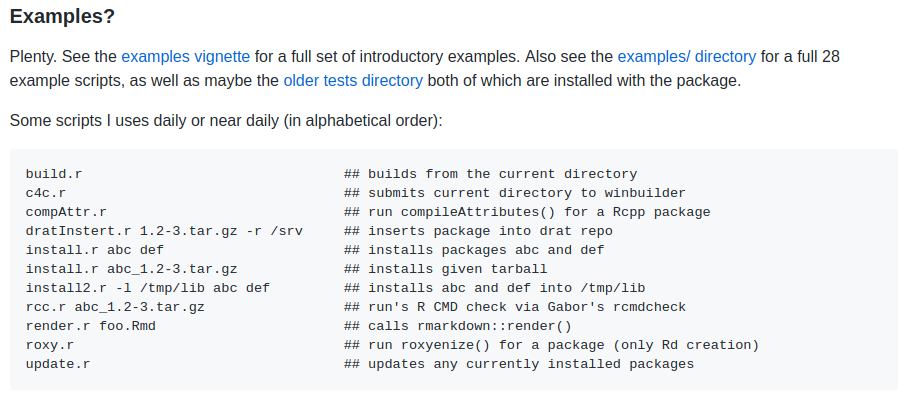littler 0.3.23 on CRAN: More Features (and Fixes)

The twentythird release of littler as a CRAN package landed on CRAN just now, following in the now twenty year history (!!) as a (initially non-CRAN) package started by Jeff in 2006, and joined by me a few weeks later.
littler
is the first command-line interface for R as it predates
Rscript. It allows for piping as well for shebang
scripting via #!, uses command-line arguments more
consistently and still starts
faster. It also always loaded the methods package which
Rscript only began to do in later years.
littler
lives on Linux and Unix, has its difficulties on macOS due to
some-braindeadedness there (who ever thought case-insensitive
filesystems as a default were a good idea?) and simply does not exist on
Windows (yet – the build system could be extended – see RInside for
an existence proof, and volunteers are welcome!). See the FAQ
vignette on how to add it to your PATH. A few examples
are highlighted at the Github repo:, as well
as in the examples
vignette.
This release, the first in about eleven months, once again brings two
new helper scripts, and enhances six existing one. The release was
triggered because it finally became clear why
installGitHub.r ignored r2u when available: we forced the
type argument to ‘source’ (so thanks to Iñaki for spotting this). One
change was once again contributed by Michael which is again
greatly appreciated.
The full change description follows.
Changes in littler version 0.3.22 (2026-02-03)
Changes in examples scripts
A new script
busybees.raggregates deadlined packages by maintainerSeveral small updated have been made to the (mostly internal) 'r2u.r' script
The
deadliners.rscript has refined treatment for screen widthThe
install2.rscript has new options--quietand--verboseas proposed by Zivan KaramanThe
rcc.rscript passes build-args to 'rcmdcheck' to compact vignettes and save dataThe
installRub.rscript now defaults to 'noble' and is more tolerant of inputsThe
installRub.rscript deals correctly with emptyutils::osVersionthanks to Michael ChiricoNew script
checkPackageUrls.rinspired by how CRAN checks (with thanks to Kurt Hornik for the hint)The
installGithub.rscript now adjusts tobspmand takes advantage of r2u binaries for its build dependenciesChanges in package
Environment variables (read at build time) can use double quotes
Continuous intgegration scripts received a minor update
My CRANberries
service provides a comparison to the
previous release. Full details for the littler
release are provided as usual at the ChangeLog
page, and also on the package docs website.
The code is available via the GitHub repo, from
tarballs and now of course also from its CRAN page and
via install.packages("littler"). Binary packages are
available directly in Debian as
well as (in a day or two) Ubuntu binaries at
CRAN thanks to the tireless Michael Rutter. Comments and suggestions
are welcome at the GitHub repo.
This post by Dirk Eddelbuettel originated on his Thinking inside the box blog. If you like this or other open-source work I do, you can sponsor me at GitHub.

